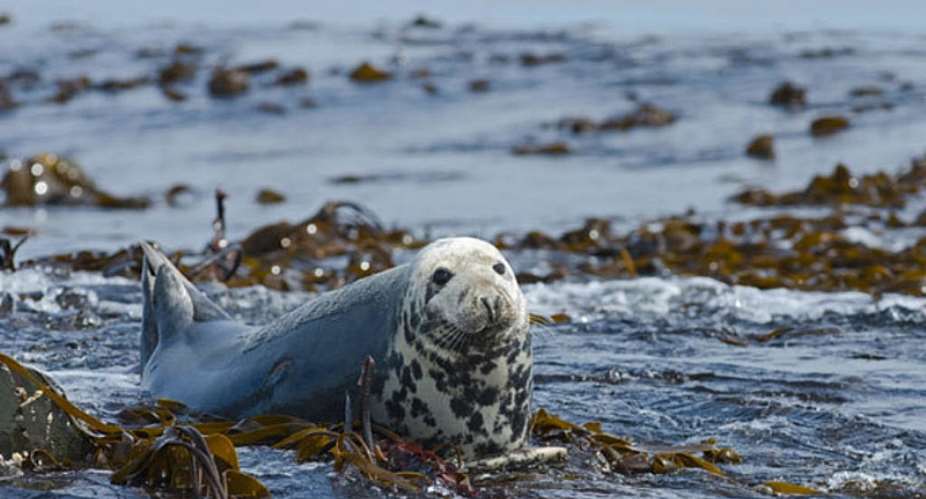A fisherman facing charges for decapitating a seal has appeared with his former captain in a courthouse in western France. Prosecutors sought fines for each man in a case that plaintiffs say underlines a wider problem of fishing in waters with protected species.
The fisherman, 37, and his former captain, 48, stated their cases in a court in Quimper near the western tip of Brittany on Monday in a case that began with the discovery of a severed seal's head in February 2019.
Authorities opened an investigation after finding the head suspended by fishing ropes near the seawall near Concarneau, a port city whose medieval walled town is popular with tourists.
Two weeks later, a civilian walking on a nearby beach found the rest of the remains of the animal. A second decapitated seal was found on the same beach days later.
News of the incidents spread. In April 2019, the gendarmerie police force launched a call for witnesses, and the French office of environmental protection group Sea Shepherd offered a 10,000-euro reward for information leading to the identification of who was responsible.
In early May, investigators detained a man who had reportedly shown the head of the seal to acquaintances.
“Our proposal of 10,000 euros led two witnesses to speak to investigators,” says Lamya Essemlali, president of Sea Shepherd France. “That's what allowed gendarmes to identify the perpetrators.”
Hunting trophy
During the hearing, the fisherman explained having found a dozen seals caught in fishing nets over the course of two months and, believing they were dead, decided to turn a head into a trophy.
“After the ninth seal, I asked my captain's permission to take the head and have it stuffed,” the man told the court according to regional newspaper Le Télégramme.
“I decapitated the dead seal and left the head at the seawall at Concarneau so the crabs and fish could clean it. The head disappeared, so I decapitated another dead seal, again in front of the captain. I didn't know it was forbidden.”
Investigators had found a skull in his home in Concarneau, suspended as hunters display heads of deer.
“I am a Parisian and had never seen a seal,” the man told the judge when asked why he wanted a trophy. “I wanted a souvenir, to pay tribute to it.”
Asked by plaintiffs about text messages that put into doubt whether the seals were dead, the fisherman insisted he was certain: “I love animals,” he told the court. “I even tamed a seagull.”
The former captain, who denied participating in the decapitations, faced charges of failing to declare the capture of a protected species, as well as complicity in the destruction and transport of a protected species.
Calls to put cameras on fishing boats
Prosecutors sought fines of 5,000 euros for each man, well under the maximum penalty of 150,000 and two years in prison for killing a protected species and 22,500 euros for failing to declare the capture of a protected species.
“We find it's not enough, considering what the law says,” regrets Essemlali. “There's a sense of impunity among certain fishers who capture protected species, sometimes on purpose. We don't know if that's the case here, even though the decapitation is clearly voluntary.”
For Sea Shepherd, one of 10 environmental and animal protection groups that were plaintiffs in the case, the decapitations underline inconsistencies in current laws about fishing and protected species including seals and dolphins.
“This fishing boat killed 12 seals in three months without making a sole declaration, and this is what threatens the survival of sea mammals today,” says Essemlali, who likens the laws on declaring to “asking drivers to report when they break the speed limit, without radars or patrol cars”.
The ocean protection group's recommendation is better surveillance of what happens on fishing vessels.
“If there were cameras on boats, this would not have happened, because they would have been obliged to make the declarations and they would not have decapitated the seals,” Essemlali says.
The court in Quimper set 26 November as the date for reading a verdict in the decapitation case.





 Western North been sidelined for far too long; address our needs before 2024 ele...
Western North been sidelined for far too long; address our needs before 2024 ele...
 Effutu: 'Stop eating at night and take care of your health' — Afenyo Markin advi...
Effutu: 'Stop eating at night and take care of your health' — Afenyo Markin advi...
 Akufo-Addo's desperate attempt to disrupt Yagbonwura's 1st year anniversary cele...
Akufo-Addo's desperate attempt to disrupt Yagbonwura's 1st year anniversary cele...
 Armed robbers attack, rob Sethi Brothers Ghana Limited in Tema
Armed robbers attack, rob Sethi Brothers Ghana Limited in Tema
 SML deal: We commend Manasseh for holding gov't to account, Akufo-Addo for not s...
SML deal: We commend Manasseh for holding gov't to account, Akufo-Addo for not s...
 Our recall invocation is in good faith to consider three key issues – Majority
Our recall invocation is in good faith to consider three key issues – Majority
 You’re inviting bad luck upon yourself if you use Indian hair — Spiritualist war...
You’re inviting bad luck upon yourself if you use Indian hair — Spiritualist war...
 Ejisu by-election: Police questions Kwadaso MP, two others over bribery allegati...
Ejisu by-election: Police questions Kwadaso MP, two others over bribery allegati...
 Nana Kwame Bediako is Nkrumah’s reincarnate; he’ll be president if he appoints N...
Nana Kwame Bediako is Nkrumah’s reincarnate; he’ll be president if he appoints N...
 Dumsor: Mahama gave us ‘dum, dum, dum’ but we are now in the era of ‘dum sie sie...
Dumsor: Mahama gave us ‘dum, dum, dum’ but we are now in the era of ‘dum sie sie...
